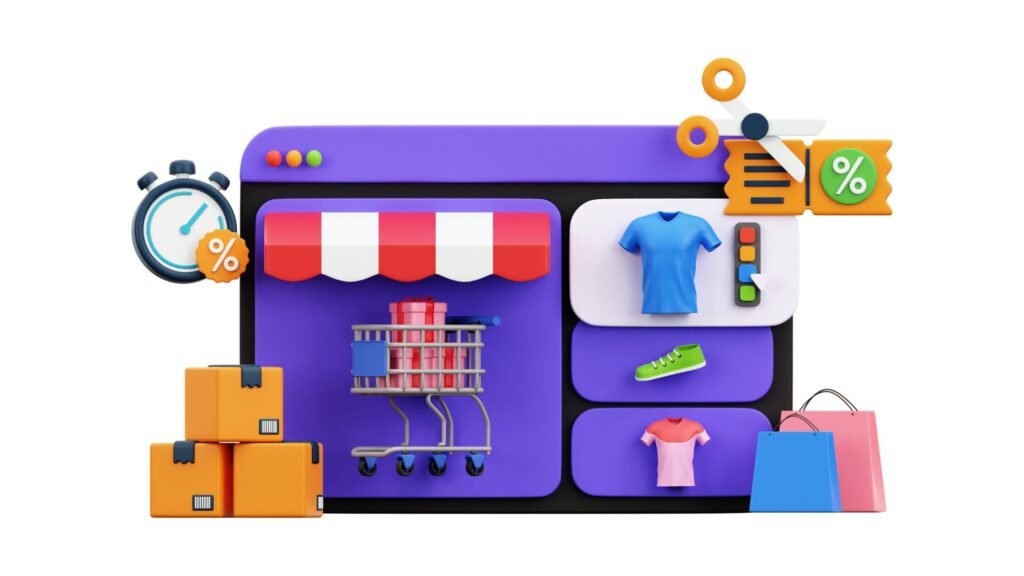
In a world where digitalization has revolutionized how we live, work, and shop, social commerce platforms are taking the online shopping experience to a new level. Combining the power of social media with e-commerce, these platforms are reshaping how businesses connect with consumers and creating an entirely new shopping ecosystem. In this blog post, we will delve into the fascinating world of social commerce platforms, exploring what they are, why they matter, and what the future holds for this innovative fusion of social networking and online shopping.
What Is Social Commerce?
Social commerce pertains to directly purchasing and selling products within social media platforms or through social networking features integrated into e-commerce websites. It merges social interaction with online shopping, allowing users to discover, discuss seamlessly, and purchase products within their favorite social media environments.
What Are Social Commerce Platforms?
Social commerce platforms are online platforms that combine social media and e-commerce functionalities to facilitate buying and selling products or services. These platforms leverage social networking to create a more interactive and engaging user shopping experience.
Why Social Commerce Platforms Are Important In The Modern E-commerce Landscape
- Integration with Social Media: Social commerce platforms seamlessly integrate with popular social media channels like Facebook, Instagram, and Pinterest. This integration allows users to explore and purchase products without leaving their preferred social networking sites, providing a frictionless shopping experience within the familiar social media environment. These platforms tap into the user’s existing online habits by bridging the gap between socializing and shopping.
- Shoppable Content: A key feature of social commerce platforms is the ability to transform content into a shopping experience. Businesses can strategically tag or link their products directly within posts, images, videos, or stories, making the content shoppable. Users can click on these tags to access detailed product information and seamlessly complete purchases. This integration of content and commerce enhances the user experience, turning inspiration into immediate action and driving conversion through a visually engaging interface.
- User-Generated Content (UGC): Social commerce platforms actively encourage User-Generated Content (UGC), where customers share their authentic experiences with products. This content is a valuable source of genuine reviews and recommendations, influencing potential buyers. By incorporating UGC, social commerce platforms create a community-driven marketplace where customers’ voices contribute to the narrative surrounding products, fostering trust and credibility.
- Peer Recommendations: Within social commerce environments, users can seek recommendations and opinions directly from their social circles—friends, family, or followers. The capability to participate in discussions in real time and receive peer recommendations enhances the decision-making process for users. Word-of-mouth marketing plays a pivotal role as users trust the opinions of those within their network, creating a dynamic and interactive shopping experience.
- Personalization: Social commerce platforms leverage algorithms and user data to deliver personalized product recommendations. By understanding user preferences and behavior, these platforms enhance the discoverability of products tailored to individual tastes. The integration of personalization fosters a more engaging and relevant shopping experience, increasing the likelihood of users discovering and purchasing products aligned with their interests.
- Community Building: Many social commerce platforms emphasize community building by allowing users to follow their preferred brands or influencers, join interest-based groups, and participate in discussions related to products and trends. This sense of community fosters a deeper connection between users and brands, creating a more engaging and interactive shopping environment.
- Seamless Checkout: Social commerce platforms prioritize a seamless checkout experience. Offering one-click options and minimizing redirections to external websites, these platforms reduce friction in the buying process. The streamlined checkout process contributes to higher conversion rates as users can effortlessly complete their purchases within the social commerce platform.
- Mobile Optimization: Recognizing the prevalence of mobile device usage, social commerce platforms prioritize mobile optimization. With user-friendly interfaces tailored for mobile screens, these platforms make it convenient for users to shop on the go. The emphasis on mobile optimization aligns with the evolving consumer behavior, catering to the increasing number of users accessing social commerce platforms through smartphones and tablets.
- Analytics and Insights: Businesses leveraging social commerce platforms gain access to valuable analytics and insights. This data offers a comprehensive insight into customer behavior, product performance, and sales trends. With these insights, businesses can refine their marketing strategies, optimize product offerings, and make informed decisions to enhance their overall performance within the social commerce landscape.
- Marketing Opportunities: Social commerce platforms present businesses with diverse and cost-effective marketing opportunities. Companies can utilize their presence on social media to promote products, run targeted advertisements, and collaborate with influencers. The integration of marketing tools within these platforms empowers businesses to effectively reach their target audience and capitalize on the widespread reach of social media for effective brand promotion.
Types Of Social Commerce Platforms
Social commerce platforms come in various types and can often be categorized into different categories based on their primary functionalities and features. Here are some common types of social commerce platforms:
A. Social Media-Based Platforms

These platforms primarily rely on existing social media networks to facilitate social commerce interactions. Users can discover and purchase products while engaging with their social connections and favorite brands within the social media environment. Examples include:
- Instagram Shopping allows businesses to create shoppable posts and tags.
- Facebook Marketplace Enables the buying and selling of products within the Facebook platform.
- Pinterest Shopping integrates shopping features with users’ boards and pins.
- Twitter Buy Buttons are used to facilitate purchases directly through tweets.
B. Dedicated Social Commerce Platforms

These platforms are designed specifically for social commerce and often provide businesses with tools to set up and manage online stores. They may integrate with social media for marketing but primarily focus on e-commerce. Examples include:
- Shopify offers a comprehensive e-commerce platform with social commerce integrations.
- WooCommerce: A WordPress plugin that turns websites into e-commerce stores with options for social commerce.
- BigCommerce provides an e-commerce platform with social media integrations.
C. Hybrid Platforms

Hybrid platforms combine elements of both social media and dedicated e-commerce solutions. They often introduce e-commerce functionality into existing social media platforms to enhance the shopping experience. Examples include:
- TikTok Shopping: TikTok integrates shopping features, enabling users to buy products directly through the app.
- Instagram Checkout: Allows users to purchase products directly within the Instagram app.
- Pinterest Buyable Pins: Users can buy products featured on Pinterest without leaving the platform.
10 Best Social Commerce Platforms
The popularity and effectiveness of social commerce platforms can change over time, so it’s essential to research and evaluate the current landscape before choosing a platform for your business. Here are ten social commerce platforms that were widely recognized:
1. Instagram Shopping

Instagram Shopping Is a functionality enabling businesses to craft shoppable posts and tags, allowing users to explore product details and complete purchases seamlessly within the platform without navigating away. Instagram app when they click on a tagged product. It’s widely used by businesses to showcase their products in a visually appealing manner to a large and engaged audience.
2. Facebook Marketplace

Facebook Marketplace is a dedicated section within the platform where users can purchase and sell diverse products and services. It facilitates local and global commerce, making it A versatile platform catering to individuals and businesses to list items for sale and discover products from others.
3. Pinterest Shopping

Pinterest Shopping integrates shopping features with the Pinterest platform. Users can discover products through pins and boards, save them for later, and click through to make purchases. Pinterest is particularly popular for its visual and discovery-oriented approach to shopping.
4. Shopify

Shopify is a robust e-commerce platform that enables businesses to establish and manage online stores. It offers many features, including social commerce integrations, to help companies sell products effectively online. Shopify allows businesses to customize their stores and connect with various social media platforms for marketing.
5. WooCommerce

WooCommerce is a popular WordPress plugin transforms websites into fully functional e-commerce stores. It’s known for its flexibility and ease of use, making it suitable for businesses of all sizes. WooCommerce can be extended with plugins and integrations to enable social commerce functionalities.
6. TikTok Shopping

TikTok has been expanding its social commerce capabilities by introducing shopping features that allow users to Explore and buy products directly through the TikTok application. It leverages the app’s engaging short-form videos for product promotion.
7. BigCommerce

BigCommerce is an e-commerce platform offering various tools and features crafted to support businesses developing and overseeing their online stores. It includes social media integrations to enable companies to sell products across multiple channels and reach a broader audience.
8. WeChat Mini Programs

WeChat Mini Programs are small applications within the WeChat app that are widely used in China. Businesses can create mini-programs to offer social commerce experiences to users, including shopping, reservations, and other services.
9. Amazon Live

Amazon Live is a feature that allows brands to host live video streams to showcase and demonstrate their products to Amazon shoppers. Viewers can interact with hosts and make purchases directly from the live stream.
10. Depop

Depop is a mobile-centric social commerce platform focusing on fashion and lifestyle products. Users can purchase and sell clothing, accessories, and unique items. Depop emphasizes the visual aspect of product listings, making it popular among fashion enthusiasts.
Tips For Success On Social Commerce Platforms
Success on social commerce platforms requires a strategic approach that combines effective marketing, engagement, and customer service. Here are some tips to help you achieve success on social commerce platforms:
- Optimize your social profiles:
- Ensure your social media profiles on platforms like Instagram, Facebook, and Pinterest are complete, including detailed descriptions, contact information, and links to your online store.
- Use high-quality images and visually appealing content to showcase your products.
- Understand Your Audience:
- Research and understand your target audience’s preferences, interests, and shopping behaviors. This will aid you in generating content and products that resonate with them.
- Leverage User-Generated Content (UGC):
- Encourage customers to communicate their experiences with your products through reviews, photos, and testimonials.
- Display user-generated content on your social media profiles to build trust and credibility.
- Implement Shoppable Posts and Tags:
- Take advantage of shoppable features available on social commerce platforms to make it easy for users to click and purchase products directly from your posts.
- Run Targeted Ads:
- Harness targeted advertising on social media platforms to connect with particular demographics and interests relevant to your products.
- Test different ad formats, such as carousel or video advertisements, to identify the most effective option for your audience.
- Engage with Your Audience:
- Respond promptly to customers’ and potential buyers’ comments, messages, and inquiries.
- Craft compelling content that prompts likes, shares, and comments, as these interactions can boost your visibility.
- Leverage Influencer Marketing:
- Partner with influencers or micro-influencers in your niche to promote your products. Influencers can provide authentic recommendations and expand your reach.
- Offer Exclusive Deals and Promotions:
- Establish a sense of urgency by providing discounts with a limited-time offer, flash sales, or exclusive offers to entice users to purchase.
- Provide Excellent Customer Service:
- Ensure a seamless and positive customer experience, from browsing to checkout and post-purchase support.
- Address customer inquiries and issues promptly and professionally.
- Use Data and Analytics:
- Utilize analytics tools provided by social commerce platforms to monitor the effectiveness of your posts, advertisements, and products.
- Use data-driven insights to refine your marketing strategies and product offerings.
- Test and Iterate:
- Continuously test different approaches, such as posting schedules, content types, and ad campaigns.
- Monitor the results and adjust your strategies based on what works best for your audience.
- Build Trust and Transparency:
- Ensure transparency regarding your products, pricing, and shipping policies.
- Emphasize customer reviews and ratings to foster trust with potential buyers.
- Mobile Optimization:
- Ensure your social commerce presence is mobile-friendly, as many users shop on mobile devices.
- Optimize your website and the checkout process to cater to mobile users.
- Stay Informed About Trends:
- Keep up with the latest trends in social commerce, such as live shopping, augmented reality (AR) experiences, and emerging social media platforms.
- Be open to adopting new features and technologies as they become available.
- Measure ROI:
- Keep track of your return on investment (ROI) by monitoring sales generated from your social commerce efforts.
- Modify your budget and strategies according to your ROI analysis.
Benefits Of Social Commerce

Integrating social media and e-commerce, social commerce offers numerous benefits for businesses and consumers. Here are some of the key advantages of social commerce:
- Enhanced Customer Engagement:
- Social commerce lets businesses directly engage with their customers on social media platforms.
- Real-time interactions, comments, and direct messaging can lead to more meaningful customer relationships.
- Expanded Reach and Discovery:
- Social media platforms have vast user bases, enabling Enable businesses to access a broader and more varied audience.
- Users can discover products and services through shared content, recommendations, and sponsored posts.
- Improved Personalization:
- Social commerce platforms collect user data and preferences, allowing businesses to provide tailored product recommendations and targeted advertising.
- Personalization improves the overall shopping experience and boosts the probability of conversions.
- User-Generated Content (UGC):
- Customers often share their experiences, reviews, and photos of products on social media.
- UGC serves as social proof, builds trust, and encourages others to purchase.
- Seamless Shopping Experience:
- Many social commerce platforms offer in-app shopping features, allowing users to purchase without leaving the platform.
- This reduces friction in the buying process, leading to higher conversion rates.
- Social Sharing and Virality:
- Social media users can easily share products and promotions with their networks.
- Viral marketing can lead to rapid product adoption and increased brand visibility.
Conclusion
Social commerce platforms have transformed how businesses connect with customers and conduct e-commerce. These platforms offer many benefits, from enhanced customer engagement and expanded reach to improved personalization and seamless shopping experiences. They enable businesses to harness the power of social media to build trust, drive conversions, and stay competitive in the digital era.
Have you tried social commerce for your business or made purchases through social media? Express your insights and opinions in the comments section below.








No Comments